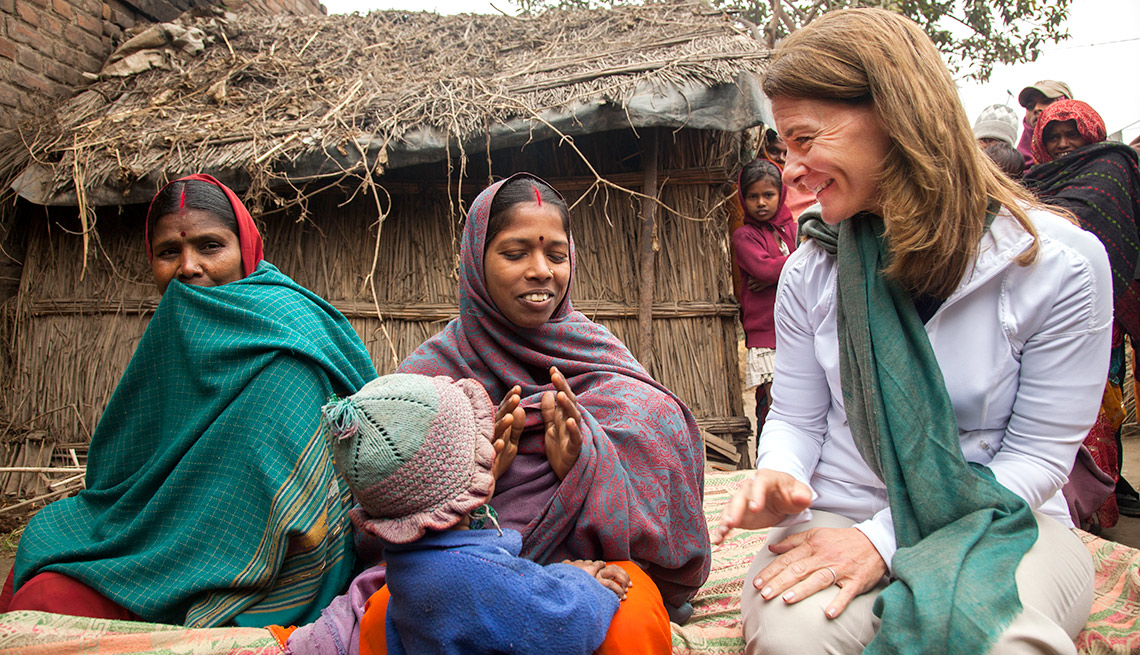A Conversation With Melinda Gates
The philanthropist on turning 50 with inspiration and optimism

Joe Pugliese/AUGUST
Melinda Gates, co-founder of the Bill & Melinda Gates Foundation and contributor to the new book "The Mother & Child Project," shares how activism and optimism play leading roles in her life.
En español | You visit the developing world several times a year and Europe for advocacy trips. As you travel the globe, what outrages you?
The fact that 6.5 million children still die before their fifth birthday each year. That just doesn't need to happen today. Bill [Microsoft cofounder Gates] and I think that figure can be cut in half in the next 15 years.
Was there a particular moment when you decided to focus on women and family planning?
I was sitting with a group of women in Nairobi, and a Kenyan woman named Marianne summed it all up so beautifully: "I want to do the right thing for this child before I bring another one into the world." I thought, "That's exactly right."
March is Women's History Month. Which women have most inspired you?
First and foremost, Mother Teresa. Then Ada Lovelace, the first computer programmer. The third is Jane Otai, whom I befriended in Nairobi. She grew up in the slums, moved out and got a job in the city, and now has decided to return to serve women in the same slum and make sure they have access to things like contraceptives.
What is dealing with Third World problems like when you lead the ultimate First World life?
When I meet families on the ground in Bangladesh or India or Africa, I realize how much they're actually like families like mine in the United States. What they care about is their children growing up healthy and getting a great education so they can reach their full potential. That is a universal truth.
How does being a data geek and computer scientist affect your approach toward philanthropy?
With that background, I'm always asking, "Do we really know whether this program is making a difference? What do the statistics show us?" And if the data doesn't exist, "How do we build a data system to make sure that it does exist?"

Courtesy Bill and Melinda Gates Foundation
Philanthropist Melinda Gates focuses her global humanitarian efforts on women and family planning initiatives.
What do you consider the most exciting health technology breakthrough?
Vaccines. We take them so for granted here in the United States. I see women in the developing world line up to get vaccines for their children. They will tell you that they walked 10 kilometers in the heat because they know that vaccine, whether it's mumps or measles or rubella, will keep their child alive.
As a practicing Catholic, what do you think of Pope Francis?
His mission of saying the Catholic Church needs to return to its roots and focus on the poor is absolutely fantastic.
You turned 50 last August. How does life look different?
I love being 50. I took a pause when I turned 50 to reflect on the last 30 years and to look forward. I want real change in my lifetime.
For your birthday, your sister organized a Sound of Music party. Did you have fun?
It was a blast! We tried to learn the Landler waltz. I love that scene in The Sound of Music. We weren't so good at it, but we did try — all 19 of us in my extended family.
You and Bill have three teenagers — two girls and a boy. What advice do you give them?
To find their passion and to follow it.
What apps or gadgets can't you live without?
My cellphone. My daughter is off at college, and she texts me.
Can we call you an optimist?
Absolutely. Bill and I call ourselves impatient optimists. We think the chance for poor people to improve their lives in the next 15 years will be greater than at any other time in history because of innovations we see coming along.
Also of Interest
- 20 boomer movies, books and shows that totally flopped
- Conversation with Sully Sullenberger
- Help bring relief to struggling seniors; find volunteer opportunities near you
Join AARP — Get access to exclusive benefits and discounts
